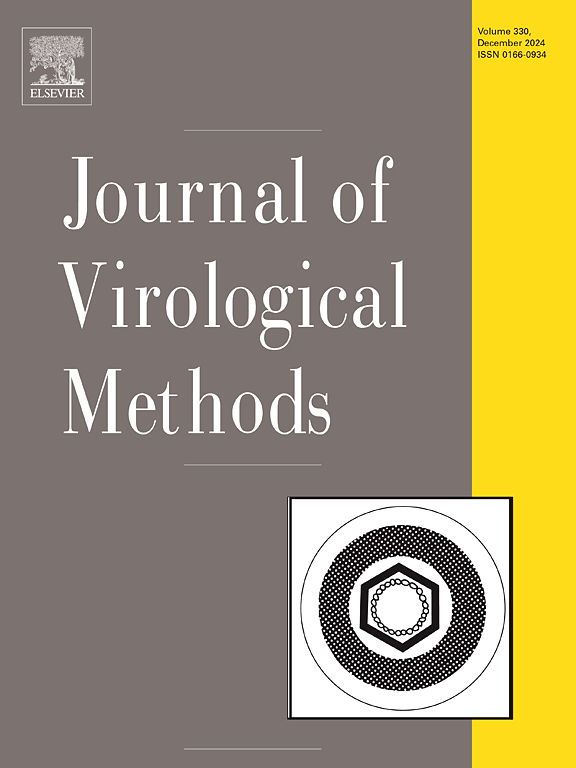对弗林德斯技术的评价与储存和分子检测传染性皮下和造血坏死病毒(IHHNV) DNA的卡有关
IF 1.6
4区 医学
Q3 BIOCHEMICAL RESEARCH METHODS
引用次数: 0
摘要
Finders Technology Associates (FTA)卡为样品的存储、运输和提取提供了简化的解决方案。在这项研究中,我们评估了在不同条件(-20°C, 4°C, 25°C, 37°C)下模拟运输60d后,在FTA卡上储存IHHNV DNA样本的诊断效果。通过比较两种洗脱方法,在室温下用FTA纯化试剂进行3次洗脱,再用TE缓冲液进行2次洗脱,每次洗脱时间为5 min,洗脱量为200 μL,洗脱效果最佳。最终洗脱后,在室温下风干1 h,然后进行实时PCR分析。我们的研究结果显示,核酸保存在储存温度和时间方面没有统计学差异(P >; 0.05)。这表明存储在FTA卡上的核酸在所有测试温度条件下都保持稳定至少2个月。为了进行现场IHHNV监测,我们分析了对虾匀浆样本。我们的研究结果表明,在使用实时PCR分析时,使用FTA卡直接从虾组织中洗脱和提取核酸的结果与传统试剂盒的结果相当。这强调了这两种核酸提取方法的等效性。FTA卡被证明是储存和检测IHHNV DNA样本的有效工具,提供了一种方便和环保的解决方案。这种方法可以经常使用,并且很容易通过标准邮政系统运输,使其对跨境运输特别有利。本文章由计算机程序翻译,如有差异,请以英文原文为准。
Evaluation of the flinders technology associates cards for storage and molecular detection of Infectious hypodermal and hematopoietic necrosis virus (IHHNV) DNA
Finders Technology Associates (FTA) cards offer a streamlined solution for the storage, transportation, and extraction of samples. In this study, we assessed the diagnostic efficacy of IHHNV DNA sample storage on FTA cards following simulated transportation under varying conditions (-20°C, 4°C, 25°C, 37°C) over a 60d period. By comparing two elution methods, we determined that optimal results were achieved by performing three elutions with FTA purification reagent at room temperature, followed by two elutions with TE buffer, each lasting 5 min, with a 200 μL elution volume. After the final elution, the membrane was air-dried at room temperature for 1 h before real-time PCR analysis. Our findings revealed that there was no statistically significant difference in nucleic acid preservation with respect to storage temperature and time (P > 0.05). This suggests that nucleic acids stored on FTA cards remained stable under all tested temperature conditions for a minimum of 2 months. For on-site IHHNV monitoring, we analyzed shrimp homogenate samples. Our results demonstrated that eluting and extracting nucleic acid directly from shrimp tissue using FTA cards yielded results comparable in magnitude to conventional reagent kits when analyzed using real-time PCR. This underscores the equivalence of these two methods for nucleic acid extraction. FTA cards prove to be an effective tool for storing and detecting IHHNV DNA samples, offering a convenient and environmentally friendly solution. This method can be routinely employed and easily transported via standard postal systems, making it particularly advantageous for cross-border transportation.
求助全文
通过发布文献求助,成功后即可免费获取论文全文。
去求助
来源期刊
CiteScore
5.80
自引率
0.00%
发文量
209
审稿时长
41 days
期刊介绍:
The Journal of Virological Methods focuses on original, high quality research papers that describe novel and comprehensively tested methods which enhance human, animal, plant, bacterial or environmental virology and prions research and discovery.
The methods may include, but not limited to, the study of:
Viral components and morphology-
Virus isolation, propagation and development of viral vectors-
Viral pathogenesis, oncogenesis, vaccines and antivirals-
Virus replication, host-pathogen interactions and responses-
Virus transmission, prevention, control and treatment-
Viral metagenomics and virome-
Virus ecology, adaption and evolution-
Applied virology such as nanotechnology-
Viral diagnosis with novelty and comprehensive evaluation.
We seek articles, systematic reviews, meta-analyses and laboratory protocols that include comprehensive technical details with statistical confirmations that provide validations against current best practice, international standards or quality assurance programs and which advance knowledge in virology leading to improved medical, veterinary or agricultural practices and management.

 求助内容:
求助内容: 应助结果提醒方式:
应助结果提醒方式:


